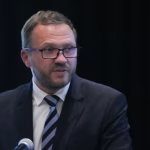LUANDA, ANGOLA — Efforts to resolve the ongoing conflict in the eastern Democratic Republic of Congo (DRC) faced a major setback as peace talks between DRC President Felix Tshisekedi and Rwandan President Paul Kagame were canceled on Sunday due to a deadlock in negotiations.
The summit, hosted by Angolan President João Lourenço, who serves as the African Union mediator, had raised hopes for a breakthrough. However, by midday, officials confirmed the meeting would not proceed as planned.
Key Sticking Point: Direct Talks with M23 Rebels
The primary impasse revolved around Rwanda’s demand that the DRC engage in direct dialogue with the M23 rebel group, a Rwanda-backed militia that has seized large swathes of the eastern DRC since 2021, displacing thousands and worsening an already dire humanitarian crisis.
«There is a stalemate because the Rwandans have set as a precondition for the signing of an agreement that the DRC hold a direct dialogue with the M23,» said Giscard Kusema, spokesperson for the Congolese presidency.
Rwandan Foreign Minister Olivier Nduhungirehe had earlier emphasized the need for the DRC to commit to direct negotiations with the M23 «within a well-defined framework and timeframe.»
Kinshasa, however, accuses Rwanda of directly supporting the M23 and asserts that the militia would not exist without Kigali’s military backing. «If Kigali is in good faith and withdraws its troops from Congolese soil, the conflict will naturally end with the M23,» a Congolese government source said.
Fragile Truce and Escalating Violence
The failure of the talks comes amid a fragile ceasefire brokered by Angola in August. While the truce initially helped stabilize front-line positions, clashes have resumed and intensified since late October.
The mineral-rich eastern DRC, home to a web of armed groups, has endured decades of internal and cross-border violence. Tshisekedi recently described the M23 and the Rwandan military as «enemies of the Republic,» underscoring the deep-seated tensions between the two nations.
In Goma, the capital of North Kivu province and a hub for over a million displaced people, the situation remains dire as the city is nearly encircled by M23 rebels and Rwandan forces.
Monitoring and Withdrawal Plans
In November, the DRC and Rwanda, under Angolan mediation, established a committee to monitor ceasefire violations and approved a document outlining terms for Rwanda’s withdrawal from Congolese territory.
A prior draft from August tied Rwanda’s disengagement to the dismantling of the Democratic Forces for the Liberation of Rwanda (FDLR), a militia formed by ethnic Hutus involved in the 1994 Rwandan genocide. The DRC rejected this condition, demanding that Rwanda’s withdrawal occur simultaneously with the FDLR’s neutralization.
The final document, seen by AFP, proposed a 90-day timeline to dismantle the FDLR and lift Rwanda’s defensive measures.
Path to Peace Remains Elusive
The collapse of Sunday’s summit underscores the challenges of finding a resolution to the conflict, as both sides remain entrenched in their positions.
For the DRC, ending the M23 insurgency is tied to curbing what it perceives as direct Rwandan interference. For Rwanda, any solution must address its security concerns, including the presence of the FDLR on Congolese soil.
Without meaningful progress in negotiations, the prospects for peace and stability in the region remain uncertain.


